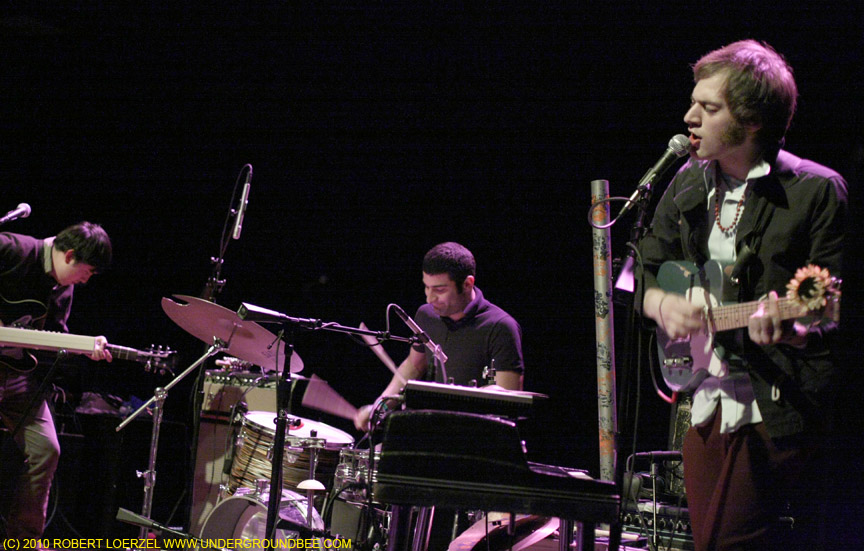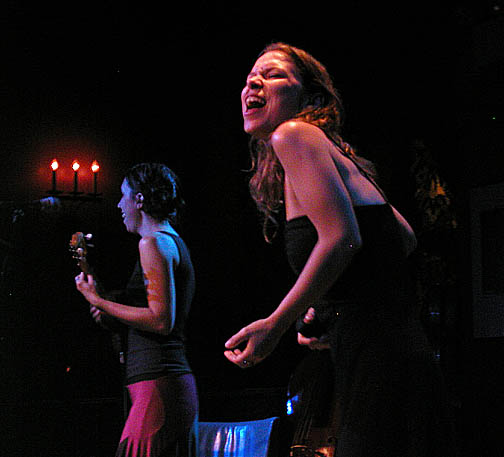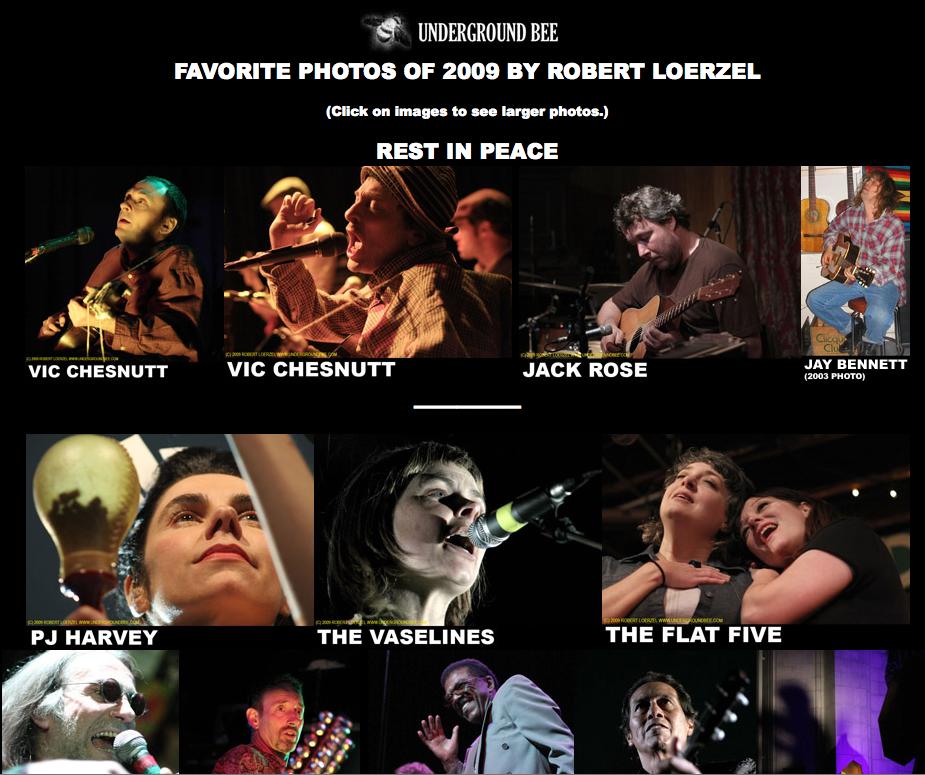 1. NEKO CASE: MIDDLE CYCLONE (Anti) — Neko Case has been the one of the decade’s best artists, with a string of sublime records that blur the lines between country, folk, rock and Girl Group pop. Her career peak so far is 2006’s Fox Confessor Brings the Flood. Coming after that subtle masterpiece, just about anything might seem disappointing, but Middle Cyclone turns out to be another excellent collection of Case’s artfully written, arranged and performed songs. Case’s songs never overstay their welcome, ending after just the right number of verses and choruses. Case deservedly gets a lot of attention for her voice, but don’t overlook her interesting choice of words — or the unusual structures she employs in some songs. For example, in “People Got a Lotta Nerve,” a guitar solos with a rising melody after the first chorus. After the second chorus, Case sings the same melody, hitting a breathtaking high note (while Kelly Hogan, Rachel Flotard and Nora O’Connor are singing lovely backup vocals). That sort of creative touch draws you back into these songs again and again. And yes, her voice is as impressive as ever, whether she’s softly cooing or belting out a note with almost fearsome strength.
1. NEKO CASE: MIDDLE CYCLONE (Anti) — Neko Case has been the one of the decade’s best artists, with a string of sublime records that blur the lines between country, folk, rock and Girl Group pop. Her career peak so far is 2006’s Fox Confessor Brings the Flood. Coming after that subtle masterpiece, just about anything might seem disappointing, but Middle Cyclone turns out to be another excellent collection of Case’s artfully written, arranged and performed songs. Case’s songs never overstay their welcome, ending after just the right number of verses and choruses. Case deservedly gets a lot of attention for her voice, but don’t overlook her interesting choice of words — or the unusual structures she employs in some songs. For example, in “People Got a Lotta Nerve,” a guitar solos with a rising melody after the first chorus. After the second chorus, Case sings the same melody, hitting a breathtaking high note (while Kelly Hogan, Rachel Flotard and Nora O’Connor are singing lovely backup vocals). That sort of creative touch draws you back into these songs again and again. And yes, her voice is as impressive as ever, whether she’s softly cooing or belting out a note with almost fearsome strength.
www.nekocase.com
www.myspace.com/nekocase
 2. VIC CHESNUTT: AT THE CUT (Constellation) — The long-revered singer-songwriter Vic Chesnutt released two records this fall. The other, Skitter at Take-Off, is a fine collection of unplugged songs, but At the Cut lifts Chesnutt’s vulnerable songs to another level. Working for the second time with a backup band that includes Guy Picciotto of Fugazi and members of the Montréal band Silver Mt. Zion, Chesnutt transforms some of his quiet little songs into sweeping epics. Opening track “Coward,” one of the year’s best songs, practically erupts with force and passion. And then on the next track, “When the Bottom Fell Out,” Chesnutt sings an indelible melody in a fragile falsetto over nothing about acoustic guitar. Throughout the record, Chesnutt sounds wise and wistful as he sings songs drawn from his life experiences.
2. VIC CHESNUTT: AT THE CUT (Constellation) — The long-revered singer-songwriter Vic Chesnutt released two records this fall. The other, Skitter at Take-Off, is a fine collection of unplugged songs, but At the Cut lifts Chesnutt’s vulnerable songs to another level. Working for the second time with a backup band that includes Guy Picciotto of Fugazi and members of the Montréal band Silver Mt. Zion, Chesnutt transforms some of his quiet little songs into sweeping epics. Opening track “Coward,” one of the year’s best songs, practically erupts with force and passion. And then on the next track, “When the Bottom Fell Out,” Chesnutt sings an indelible melody in a fragile falsetto over nothing about acoustic guitar. Throughout the record, Chesnutt sounds wise and wistful as he sings songs drawn from his life experiences.
www.vicchesnutt.com
www.myspace.com/vicchesnutt
 3. ST. VINCENT: ACTOR (4AD) — On the year’s most colorful album, St. Vincent (a.k.a. Annie Clark) sounds like a choir, an orchestra and an electric-guitar goddess, all rolled into one. The musical landscape constantly shifts behind her, with a startling variety of sounds coming and going. Clark also proves herself to be an expert storyteller and poet with these evocative songs, which often seems like glimpses of some strange film.
3. ST. VINCENT: ACTOR (4AD) — On the year’s most colorful album, St. Vincent (a.k.a. Annie Clark) sounds like a choir, an orchestra and an electric-guitar goddess, all rolled into one. The musical landscape constantly shifts behind her, with a startling variety of sounds coming and going. Clark also proves herself to be an expert storyteller and poet with these evocative songs, which often seems like glimpses of some strange film.
www.ilovestvincent.com
www.myspace.com/stvincent
 4. LHASA DE SELA: LHASA (Nettwerk) — Lhasa de Sela (or simply Lhasa, if you prefer) is a terrifically talented singer-songwriter who puts out records far too seldom. She’s had three albums so far, with six-year gaps in between. Of Mexican descent, she lives in Montréal, and she has some experience as a traveling circus performer. Her previous album, 2003’s The Living Road, is one of my favorites of the decade. On her new CD, Lhasa sings all of her lyrics in English for the first time. (Previously, she alternated between English, Spanish and French.) Mixed by Thierry Amar of Silver Mt. Zion, Lhasa is an intimate solo performance, often featuring little more than piano or guitar as Lhasa sings honest songs of delicate beauty tinged with sorrow but also a sense of wonder at the world. Her music is indefinable, existing somewhere in a hinterland beyond world music, indie rock, folk and cabaret. It’s a shame that her record received barely any attention this year. (And let’s hope Lhasa is recovering from the unspecified “serious health issue” she cited as the reason for canceling some 2009 tour dates.)
4. LHASA DE SELA: LHASA (Nettwerk) — Lhasa de Sela (or simply Lhasa, if you prefer) is a terrifically talented singer-songwriter who puts out records far too seldom. She’s had three albums so far, with six-year gaps in between. Of Mexican descent, she lives in Montréal, and she has some experience as a traveling circus performer. Her previous album, 2003’s The Living Road, is one of my favorites of the decade. On her new CD, Lhasa sings all of her lyrics in English for the first time. (Previously, she alternated between English, Spanish and French.) Mixed by Thierry Amar of Silver Mt. Zion, Lhasa is an intimate solo performance, often featuring little more than piano or guitar as Lhasa sings honest songs of delicate beauty tinged with sorrow but also a sense of wonder at the world. Her music is indefinable, existing somewhere in a hinterland beyond world music, indie rock, folk and cabaret. It’s a shame that her record received barely any attention this year. (And let’s hope Lhasa is recovering from the unspecified “serious health issue” she cited as the reason for canceling some 2009 tour dates.)
http://lhasadesela.com
www.myspace.com/lhasadeselamusic
 5. SONIC YOUTH: THE ETERNAL (Matador) — As the members of Sonic Youth grow older, they aren’t losing any of their creative spark. The venerable New York noise-rock band has released some top-notch records in recent years, including Murray Street and Rather Ripped, and the winning streak continues with this strong set of energized rockers. Sonic Youth’s unconventional guitar tunings and peculiar song structures are still evident, but the band channels those quirks into concise and even catchy songs. After many repeat listens, it becomes clear that Sonic Youth is still going at full strength.
5. SONIC YOUTH: THE ETERNAL (Matador) — As the members of Sonic Youth grow older, they aren’t losing any of their creative spark. The venerable New York noise-rock band has released some top-notch records in recent years, including Murray Street and Rather Ripped, and the winning streak continues with this strong set of energized rockers. Sonic Youth’s unconventional guitar tunings and peculiar song structures are still evident, but the band channels those quirks into concise and even catchy songs. After many repeat listens, it becomes clear that Sonic Youth is still going at full strength.
www.sonicyouth.com
www.myspace.com/sonicyouth
 6. FANFARLO: RESERVOIR (Atlantic/WEA) — In some ways, this group from London seems like a typical indie-rock ensemble of the moment. It’s one of those big, sprawling groups with musicians who switch around their instruments, join their voices together in big choruses, and drum along with the drummer. Yes, we’ve seen that done before, but Fanfarlo brings its own distinct personality to this template, beautifully arranging each song with the perfect number of elements. As folk-rock strumming artfully blends with circling synthesizer lines and lead singer Simon Balthazar’s dulcet vocals, you’ll find yourself joyfully singing along to the smart lyrics.
6. FANFARLO: RESERVOIR (Atlantic/WEA) — In some ways, this group from London seems like a typical indie-rock ensemble of the moment. It’s one of those big, sprawling groups with musicians who switch around their instruments, join their voices together in big choruses, and drum along with the drummer. Yes, we’ve seen that done before, but Fanfarlo brings its own distinct personality to this template, beautifully arranging each song with the perfect number of elements. As folk-rock strumming artfully blends with circling synthesizer lines and lead singer Simon Balthazar’s dulcet vocals, you’ll find yourself joyfully singing along to the smart lyrics.
www.fanfarlo.com
www.myspace.com/fanfarlo
 7. THE ANTLERS: HOSPICE (Frenchkiss) — The year’s most emotional album, a song cycle about a girl dying in a hospice. Listeners may either find it unbearably sad (especially if they follow along with the lyrics booklet) or powerfully cathartic. It’s rare to hear any pop music take such an unblinking look at the subject of death and how to deal with it. The Antlers’ lush art-rock arrangements are an appropriate setting for this musical novel, and Antlers front man Peter Silberman’s falsetto tells the story with compassion.
7. THE ANTLERS: HOSPICE (Frenchkiss) — The year’s most emotional album, a song cycle about a girl dying in a hospice. Listeners may either find it unbearably sad (especially if they follow along with the lyrics booklet) or powerfully cathartic. It’s rare to hear any pop music take such an unblinking look at the subject of death and how to deal with it. The Antlers’ lush art-rock arrangements are an appropriate setting for this musical novel, and Antlers front man Peter Silberman’s falsetto tells the story with compassion.
www.antlersmusic.com
www.myspace.com/theantlers
 8. CHOIR OF YOUNG BELIEVERS: THIS IS FOR THE WHITE IN YOUR EYES (Ghostly International) — Scandinavia just keeps putting out more and more good music in recent years. The region’s latest delightful export is Danish singer-songwriter Jannis Noya Makrigiannis (yes, he has a Greek name), who performs orchestral pop under the moniker Choir of Young Believers. His/their debut album is filled with tuneful songs that deserve to be popular. The arrangements are dramatic, maybe even melodramatic, as the melodies swoop or brood, depending on the mood of the moment. And Makrigiannis carries it all with his charismatic voice.
8. CHOIR OF YOUNG BELIEVERS: THIS IS FOR THE WHITE IN YOUR EYES (Ghostly International) — Scandinavia just keeps putting out more and more good music in recent years. The region’s latest delightful export is Danish singer-songwriter Jannis Noya Makrigiannis (yes, he has a Greek name), who performs orchestral pop under the moniker Choir of Young Believers. His/their debut album is filled with tuneful songs that deserve to be popular. The arrangements are dramatic, maybe even melodramatic, as the melodies swoop or brood, depending on the mood of the moment. And Makrigiannis carries it all with his charismatic voice.
http://ghostly.com/artists/choir-of-young-believers
www.myspace.com/choirofyoungbelievers
 9. DIRTY PROJECTORS: BITTE ORCA (Domino) — Believe the hype. This band created some of the smartest and most unusual music of 2009 — and somehow managed to make all of those weird, artsy chord progressions actually catchy and accessible. The serpentine guitar lines show the influence of African music, but Dirty Projectors actually do something interesting with those influences, unlike other world-music imitators such as Vampire Weekend. And the vocal harmonies are downright startling. (Even more amazing was the way Dirty Projectors duplicated those intricate vocal patterns at a concert this summer at the Pritzker Pavilion. This is no mere studio trickery.) No wonder David Byrne and Björk are hanging out with Dirty Projectors.
9. DIRTY PROJECTORS: BITTE ORCA (Domino) — Believe the hype. This band created some of the smartest and most unusual music of 2009 — and somehow managed to make all of those weird, artsy chord progressions actually catchy and accessible. The serpentine guitar lines show the influence of African music, but Dirty Projectors actually do something interesting with those influences, unlike other world-music imitators such as Vampire Weekend. And the vocal harmonies are downright startling. (Even more amazing was the way Dirty Projectors duplicated those intricate vocal patterns at a concert this summer at the Pritzker Pavilion. This is no mere studio trickery.) No wonder David Byrne and Björk are hanging out with Dirty Projectors.
www.myspace.com/dirtyprojectors
http://dominorecordco.us/artists/dirty-projectors
 10. TINARIWEN: IMIDIWAN: COMPANIONS (World Village) — These guitar-playing Touareg nomads from the Sahara Desert have released four excellent albums now, all of them filled with trance-inducing grooves. It will take more listening to determine whether this is their best record yet, but it certainly ranks up there. Thankfully, as Tinariwen has attracted a larger following around the world, it hasn’t changed much about the way it makes music. These recordings are clean and uncluttered, and the vocals have never been stronger or more compelling. There’s even a chant that sounds something like low-tech nomad hip-hop on the track “Tenhert.” Take some time to read the English translations of the lyrics. Like beautiful poetry, the simple words describe desert life and call for a revolution to make the world a better place.
10. TINARIWEN: IMIDIWAN: COMPANIONS (World Village) — These guitar-playing Touareg nomads from the Sahara Desert have released four excellent albums now, all of them filled with trance-inducing grooves. It will take more listening to determine whether this is their best record yet, but it certainly ranks up there. Thankfully, as Tinariwen has attracted a larger following around the world, it hasn’t changed much about the way it makes music. These recordings are clean and uncluttered, and the vocals have never been stronger or more compelling. There’s even a chant that sounds something like low-tech nomad hip-hop on the track “Tenhert.” Take some time to read the English translations of the lyrics. Like beautiful poetry, the simple words describe desert life and call for a revolution to make the world a better place.
www.tinariwen.com
www.myspace.com/tinariwen
 11. VARIOUS ARTISTS: DARK WAS THE NIGHT (4AD) — A who’s who of indie-rock stars contributed a slew of new songs for this two-CD Red Hot Compilation, which raises money for the fight against AIDS. Aaron and Bryce Dessner of The National did a superb job putting together one of the best various-artists records of recent years. It’s a strong testament to the versatility and creativity of today’s musicians.
11. VARIOUS ARTISTS: DARK WAS THE NIGHT (4AD) — A who’s who of indie-rock stars contributed a slew of new songs for this two-CD Red Hot Compilation, which raises money for the fight against AIDS. Aaron and Bryce Dessner of The National did a superb job putting together one of the best various-artists records of recent years. It’s a strong testament to the versatility and creativity of today’s musicians.
www.darkwasthenight.com
www.myspace.com/darkwasthenight
 12. DEATH: …FOR THE WHOLE WORLD TO SEE (Drag City) — Recorded in 1974, this powerful proto-punk album by an African-American band from Detroit did not see the light of day until 2009, when it finally escaped the attic thanks to the Drag City label. The jagged riffs are punctuated by expertly placed pieces of silence, and the passionate singing still rings true after 25 years. “Politicians in My Eye” emerges here as a long-overlooked classic of punk rock with a political conscience.
12. DEATH: …FOR THE WHOLE WORLD TO SEE (Drag City) — Recorded in 1974, this powerful proto-punk album by an African-American band from Detroit did not see the light of day until 2009, when it finally escaped the attic thanks to the Drag City label. The jagged riffs are punctuated by expertly placed pieces of silence, and the passionate singing still rings true after 25 years. “Politicians in My Eye” emerges here as a long-overlooked classic of punk rock with a political conscience.
www.myspace.com/deathprotopunk
www.dragcity.com/products/for-the-whole-world-to-see
THE REST OF MY TOP 50
13. PJ Harvey & John Parish: A Woman A Man Walked By
14. Mount Eerie: Wind’s Poem
15. Múm: Sing Along to Songs You Don’t Know
16. Bonnie “Prince” Billy: Beware
17. Oneida: Rated O
18. Camera Obscura: My Maudlin Career
19. Girls: Album
20. Brakes (a.k.a. BrakesBrakesBrakes): Touchdown
21. David Daniell and Douglas McCombs: Sycamore
22. Woods: Songs of Shame
23. Jarvis Cocker: Further Complications
24. I Was a King: I Was a King
25. Megafaun: Gather, Form & Fly
26. Jay Reatard: Watch Me Fall
27. Marianne Faithfull: Easy Come Easy Go
28. The Low Anthem: Oh My God, Charlie Darwin
29. A.A. Bondy: When the Devil’s Loose
30. Magnolia Electric Co.: Josephine
31. Andrew Bird: Noble Beast
32. Loney Dear: Dear John
33. Amadou & Mariam: Welcome to Mali
34. M. Ward: Hold Time
35. MV & EE: Barn Nova
36. The Love Language: The Love Language
37. Handsome Furs: Face Control
38. Phosphorescent: To Willie
39. DRMWPN: Bright Blue Galilee
40. Yo La Tengo: Popular Music
41. Dead Man’s Bones: Dead Man’s Bones
42. Smith Westerns: Smith Westerns
43. Alela Diane: To Be Still
44. Sin Fang Bous: Clangour
45. Flaming Lips: Embryonic
46. Human Highway: Moody Motorcycle
47. The xx: xx
48. Cotton Jones: Paranoid Cocoon
49. Bowerbirds: Upper Air
50. Warsaw Village Band: Infinity
AND EVEN MORE MUSIC I LIKED IN 2009
Some runners-up in alphabetical order. (If you don’t see a record listed here somewhere, that doesn’t necessarily mean I hated it. I didn’t hear everything, and there are plenty of records I might have listed here if I’d had more time to listen.)
Animal Collective: Merriweather Post Pavilion / Art Brut: Art Brut vs. Satan / Dan Auerbach: Keep It Hid / Bat for Lashes: Two Suns / The Bats: Guilty Office / Capsula: Rising Mountains / Vic Chesnutt: Skitter at Take-Off / Chicago Underground Duo: Boca Negra / Dan Deacon: Bromst / The Dead Weather: Horehound / Espers: III / The Fiery Furnaces: I’m Going Away / Great Lake Swimmers: Lost Channels / Grizzly Bear: Veckatimest / The Handsome Family: Honey Moon / A Hawk and a Hacksaw: Délivrance / Heavenly States: Delayer / Here We Go Magic: Here We Go Magic / Lokai: Transition / Malajube: Labyrinthine / Cass McCombs: Catacombs / Marissa Nadler: Little Hells / A.C. Newman: Get Guilty / Oniric: Sin Técnica / The Pains of Being Pure at Heart: The Pains of Being Pure at Heart / The Pink Mountaintops: Outside Love / The Reigning Sound: Love & Curses / Scotland Yard Gospel Choir: …And the Horse You Rode In On / Edward Sharpe & the Magnetic Zeros: s/t / Telekinesis: s/t / Tiny Vipers: Life on Earth / John Vanderslice: Romanian Names / Kurt Vile: Childish Prodigy / The Warlocks: The Mirror Explodes / Patrick Watson: Wooden Arms / Wilco: Wilco (the Album) / Wildbirds & Peacedrums: The Snake / Woodpigeon: Treasury Library Canada c/w Houndstooth Europa / Wye Oak: The Knot
_t607.JPG)
























































































